
SCANDINAVICA
Scope & Guideline
Fostering Insightful Dialogues on Scandinavian Narratives.
Introduction
Aims and Scopes
- Interdisciplinary Approaches to Nordic Studies:
SCANDINAVICA emphasizes a multidisciplinary perspective, integrating insights from literature, history, cultural studies, and social sciences to provide a comprehensive understanding of the Nordic experience. - Cultural Narratives and Identity:
The journal explores the intricate narratives that shape Nordic identities, including discussions on national and transnational themes, collective trauma, and the representation of history in literature. - Focus on Borealism and Nordic Aesthetics:
A unique contribution of SCANDINAVICA is its focus on 'Borealism', examining the cultural and artistic representations of the North, which includes literature, visual arts, and popular culture. - Critical Examination of Nordic Literature:
The journal publishes critical analyses of both classical and contemporary Nordic literature, exploring themes such as postmodernism, metafiction, and narrative structures in works from different eras. - Engagement with Current Societal Issues:
SCANDINAVICA addresses contemporary issues such as geopolitics, societal norms, and collective memory through the lens of Nordic cultural productions, particularly in relation to global contexts.
Trending and Emerging
- Borealism and Arctic Noir:
There is a notable increase in the exploration of 'Borealism' and associated themes such as 'Arctic Noir', which examine the cultural significance of the North in contemporary literature and media, reflecting broader societal concerns. - Transnational Perspectives:
Emerging themes emphasize transnational narratives, considering how Nordic cultures interact with global contexts and how these interactions influence literature and identity. - Collective Trauma and Memory:
Recent publications delve into themes of collective trauma and memory, particularly in the context of Nordic literature, indicating a growing interest in how historical and cultural narratives shape contemporary identities. - Intersections of Geopolitics and Culture:
The journal is increasingly addressing the intersections between geopolitics and cultural production, particularly how Nordic media, such as television series, reflect and engage with global political issues. - Narrative Complexity in Modern Literature:
There is a rising focus on narrative complexity in contemporary Nordic literature, exploring themes of metafiction, dialogism, and the multiplicity of voices, which reflects broader postmodern trends.
Declining or Waning
- Traditional Historical Narratives:
There appears to be a decreasing emphasis on traditional historical narratives, as newer publications increasingly engage with contemporary interpretations and cultural critiques rather than solely historical accounts. - Focus on Old Norse Literature:
Although still relevant, the specific focus on Old Norse literature is becoming less prominent in recent issues, as the journal shifts towards more modern literary analyses and contemporary cultural expressions. - Static Representations of Nordic Identity:
The exploration of Nordic identity in a static manner is declining. Recent publications suggest a move towards more dynamic and fluid interpretations that consider the complexities of identity in a globalized context.
Similar Journals
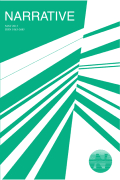
NARRATIVE
Advancing Literary Discourse and Critical ThoughtNARRATIVE is a distinguished academic journal published by Ohio State University Press, focusing on the intricate dimensions of literature and literary theory. Established in 2002, this journal has quickly risen to prominence, currently ranking first quartile (Q1) in its field according to 2023 metrics, and securing an impressive percentile of 94th among 1106 journals in Arts and Humanities. With its ISSN 1063-3685 and E-ISSN 1538-974X, NARRATIVE is committed to exploring the narrative structures and processes that shape our understanding of both literature and broader cultural phenomena. Although it does not offer open access, NARRATIVE proudly contributes to academic discourse by publishing articles that challenge, inform, and inspire scholars, professionals, and students worldwide. The journal continues to be an essential platform for innovative research and critical analysis, fostering dialogue at the intersection of storytelling, identity, and societal context.

Scandia
Illuminating the Past with Rigorous InquiryScandia is a distinguished academic journal dedicated to the field of history, published by SCANDIA in Sweden. With its origins dating back to 1976, the journal offers a platform for scholarly discourse, focusing on various historical perspectives and methodologies. Although currently not recognized as an Open Access journal, it fosters a rich exchange of ideas and original research, appealing to historians, researchers, and students alike. Operating within the Q4 quartile of its category for 2023, Scandia holds a significant position in the history landscape, ranking at #1627 out of 1760 in Scopus, representing the 7th percentile. With a commitment to quality scholarship, Scandia encourages contributions that challenge existing narratives and contribute to the broader understanding of historical contexts.
Please send your submissions or inquiries to the editorial office at Historiska Inst, Box 2074, Lund 220 02, Sweden.
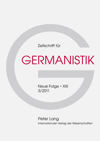
ZEITSCHRIFT FUR GERMANISTIK
Connecting Disciplines through German StudiesZEITSCHRIFT FUR GERMANISTIK, published by PETER LANG GMBH, is a distinguished academic journal that serves as a vital resource in the fields of German studies, literature, linguistics, and cultural analysis. With an ISSN of 0323-7982, this journal provides critical insights and promotes scholarly discourse surrounding the evolving landscapes of German language and literature. Although it operates under a traditional access model, readers and researchers benefit from its rigorous peer-reviewed articles that span decades of intellectual inquiry. Historically featured in Scopus, the journal is noted for its impactful contributions, ranking 244th in Literature and Literary Theory and 406th in Linguistics and Language, highlighting its importance in the academic community. Situated in Bern, Switzerland, ZEITSCHRIFT FUR GERMANISTIK not only caters to scholars seeking to enrich their understanding of Germanic studies but also aims to bridge gaps across interdisciplinary borders, fostering a deeper appreciation of the cultural narratives that shape our world.
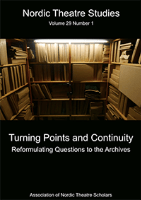
Nordic Theatre Studies
Advancing Scholarship in the Heart of Nordic Arts.Nordic Theatre Studies is a prestigious academic journal published by FORENINGEN NORDISKA TEATERFORSKARE, dedicated to the field of visual arts and performing arts, with a special emphasis on Nordic traditions and contemporary practices. With an ISSN of 0904-6380 and E-ISSN of 2002-3898, this journal serves as a vital forum for scholars, theatre practitioners, and students looking to explore the rich tapestry of Nordic theatre. Recognized for its quality, it ranks in the Q3 category in the latest 2023 rankings and boasts a significant position in the Scopus database, standing at Rank #209/667 with a 68th percentile. The journal, covering converged years from 2011 to 2012 and 2014 to 2023, provides open access to a variety of research articles, reviews, and theoretical explorations that address both historical and contemporary issues in theatre studies. By bridging academic rigor with practical insights, Nordic Theatre Studies aims to contribute to the dialogue surrounding the evolving landscape of theatre, making it an indispensable resource for researchers and practitioners alike.
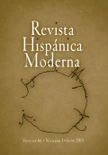
Revista Hispanica Moderna
Exploring the Depths of Hispanic HeritageRevista Hispanica Moderna, published by University of Pennsylvania Press, is a scholarly journal dedicated to exploring the rich tapestry of Hispanic cultural, historical, and literary studies. With an ISSN of 0034-9593 and an E-ISSN of 1944-6446, this esteemed publication operates within the United States, ensuring a broad international reach. While it currently does not offer Open Access, the journal provides significant insights across diverse fields, categorized as Q4 in Cultural Studies, History, and Literature and Literary Theory as per the 2023 standards. Although the journal ranks in the lower quartiles of its fields, its systematic approach to modern Hispanic studies offers valuable opportunities for gaining perspectives that are often underrepresented. Researchers, professionals, and students are encouraged to engage with its content as it navigates the complexities of cultural identities and historical narratives from 2019 to 2024 and beyond, making important contributions to the ongoing discourse in the humanities.
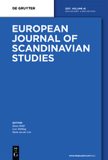
European Journal of Scandinavian Studies
Unveiling the nuances of culture, language, and literature.European Journal of Scandinavian Studies is an esteemed journal published by Walter de Gruyter GmbH, dedicated to advancing scholarship in the fields of Cultural Studies, Linguistics and Language, and Literature and Literary Theory. Since its inception in 2010, the journal has been a pivotal platform for researchers and scholars, showcasing cutting-edge research and critical discussions pertaining to Scandinavian languages and cultures. With an ISSN of 2191-9399 and an E-ISSN of 2191-9402, the journal emphasizes accessibility to impactful academic work, despite its current non-open access model. While the journal is categorized within the Q4 quartile for Cultural Studies and Linguistics/Language, it has shown notable potential in ranking higher in its specialized domains, fostering a growing community of researchers invested in Scandinavian studies. The journal's office is located in Berlin, Germany, further enriching its European scholarly context. As it continues to evolve, the European Journal of Scandinavian Studies serves as a vital resource for academics seeking to engage deeply with the multifaceted aspects of Scandinavian culture and linguistics.

Expressions maghrebines
Fostering Scholarly Dialogue in Maghreb StudiesExpressions maghrebines, an esteemed journal published by Florida State University, fosters scholarly dialogue in the realm of Literature and Literary Theory, focusing on the vibrant narratives and critical discourses emerging from the Maghreb region. Established in 2002, this journal has become a vital resource for researchers, professionals, and students, illustrating a commitment to exploring contemporary trends in Francophone literature. With an impressive Q3 rank in 2023, it stands within the top echelon of its category, offering insightful analyses and innovative perspectives to enhance academic understanding. Though not an open-access publication, Expressions maghrebines is indispensable for those seeking to delve into the cultural and intellectual currents that shape Maghreb literary landscapes, thus reinforcing its position as a significant contributor to the academic community's exploration of Francophone studies.
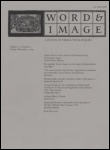
WORD & IMAGE
Exploring the Fusion of Visual and Verbal NarrativesWORD & IMAGE is a distinguished journal published by Routledge Journals, Taylor & Francis Ltd, focusing on the dynamic interplay between visual and verbal communication. Established in 1985, this esteemed journal covers a wide array of topics within linguistics, literature, and visual arts, contributing significantly to these interdisciplinary fields. With a commitment to fostering scholarly dialogue and innovation, WORD & IMAGE presents qualitative research, critical analyses, and theoretical explorations that illuminate the complex relationships between text and image. The journal's current impact factor reflects its role in nurturing academic discourse, making it a vital resource for researchers, professionals, and students alike. Although currently not open access, the journal maintains a rigorous peer-review process to ensure the highest academic standards. As it continues to engage a global audience, WORD & IMAGE serves as a key platform for advancing knowledge at the intersection of language and visual culture.

Literary Voice
Innovating Scholarship in the HumanitiesLiterary Voice is a pioneering journal dedicated to the exploration and critique of literature and its multifaceted dimensions. Established in Punjab, India, and published by LITERARY VOICE, this journal aims to serve as a vital platform for scholars, researchers, and enthusiasts in the field of literary studies. With its ISSN 2277-4521 and E-ISSN 2583-8199, Literary Voice strives to foster intellectual discourse and encourage innovative scholarship through diverse thematic issues. While currently operating without an open access model, the journal provides a crucial space for the dissemination of original research and critical analysis that contribute to the enrichment of literary understanding. As an emerging publication in the humanities, Literary Voice invites submissions from across the globe, making it an essential resource for those looking to engage with contemporary literary debates and foster cross-cultural dialogues.

REVISTA DE LITERATURA
Exploring the depths of literary theory and practice.REVISTA DE LITERATURA, published by the Consejo Superior de Investigaciones Científicas (CSIC) in Spain, stands as a beacon of scholarly excellence in the field of Literature and Literary Theory. With an impressive Q1 ranking in its category for 2023, the journal has established a reputable position within the academic community, reflected in its Scopus rank of #427 out of 1106, placing it in the top 61st percentile. Operating under an Open Access model since 2001, it ensures that cutting-edge research on literary texts, theories, and critical practices is freely accessible to all, fostering scholarly dialogue and enhancing the global discourse on literature. The journal’s continuous commitment to advancing literary scholarship from 1996 to 2024 highlights its role in addressing contemporary literary challenges while celebrating diverse voices and ideas. Researchers, professionals, and students alike are encouraged to engage with this vital resource, which not only showcases innovative research but also contributes significantly to the richness of literary studies.